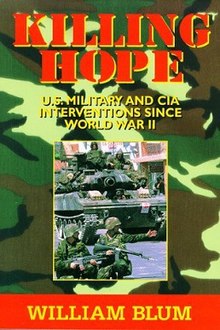
The Reagan Doctrine was stated by United States President Ronald Reagan in his State of the Union address on February 6, 1985: "We must not break faith with those who are risking their lives—on every continent from Afghanistan to Nicaragua—to defy Soviet-supported aggression and secure rights which have been ours from birth." It was a strategy implemented by the Reagan Administration to overwhelm the global influence of the Soviet Union in the late Cold War. The doctrine was a centerpiece of United States foreign policy from the early 1980s until the end of the Cold War in 1991.

The Good Neighbor policy was the foreign policy of the administration of United States President Franklin Roosevelt towards Latin America. Although the policy was implemented by the Roosevelt administration, President Woodrow Wilson had previously used the term, but subsequently went on to justify U.S. involvement in the Mexican Revolution and occupation of Haiti. Senator Henry Clay had coined the term Good Neighbor in the previous century. President Herbert Hoover turned against interventionism and developed policies that Roosevelt perfected.

Julio César Méndez Montenegro was a Guatemalan academic who served as president of Guatemala from July 1966 to July 1970. Mendez was elected on a platform promising democratic reforms and the curtailment of military power. The only civilian to occupy Guatemala's presidency during the long period of military rule between 1954 and 1986. Mendez had assumed the presidency under a pact in July 1966 that gave the armed forces carte blanche with respect to internal security matters and an effective veto over governmental policy. Nevertheless, his election and swearing in was considered a major turning point for the long military-led Guatemala. He was the first cousin of César Montenegro Paniagua whose kidnapping, torture and murder during the Julio César Méndez presidency is rumored to have been undertaken with presidential sanction.
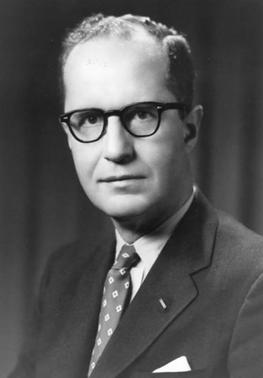
Kermit "Kim" Roosevelt Jr. was an American intelligence officer who served in the Office of Strategic Services during and following World War II. A grandson of Theodore Roosevelt, the 26th President of the United States, Roosevelt went on to establish American Friends of the Middle East and then played a lead role in the CIA's efforts to overthrow Mohammad Mosaddegh, the Majlis-appointed leader of Iran, in August 1953.
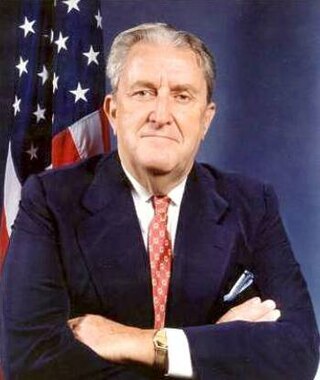
Vernon Anthony Walters was a United States Army officer and a diplomat. Most notably, he served from 1972 to 1976 as Deputy Director of Central Intelligence, from 1985 to 1989 as the United States Ambassador to the United Nations and from 1989 to 1991 as Ambassador to the Federal Republic of Germany during the decisive phase of German Reunification. Walters rose to the rank of lieutenant general in the U.S. Army and is a member of the Military Intelligence Hall of Fame.

William Henry Blum was an American author and journalist and a critic of United States foreign policy.
Michael F. Scheuer, is an American former intelligence officer for the Central Intelligence Agency, blogger, author, commentator and former adjunct professor at Georgetown University's Center for Peace and Security Studies. One assignment during his 22-year career was serving as Chief of the Bin Laden Issue Station from 1996 to 1999. He also served as Special Advisor to the Chief of Alec Station from September 2001 to November 2004.

General elections were held in Italy on 18 April 1948 to elect the first Parliament of the Italian Republic.
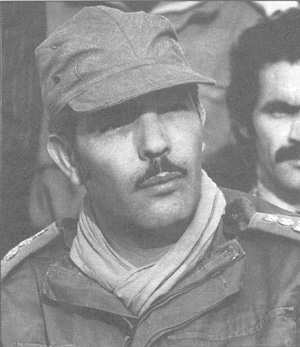
Ahmed Dlimi was a Moroccan General under the rule of Hassan II. After General Mohamed Oufkir's 1972 assassination, he became Hassan II's right-hand man. He led the Western Sahara War and played a major role in Angolan Civil War. He was promoted to General during the Green March in 1975, and took charge of the Moroccan Armed Forces in the Southern Zone, where the military were fighting the Polisario Front.

Rogue State: A Guide to the World's Only Superpower (ISBN 1-56751-374-3) is a book by William Blum first published in 2000. The 3rd revision updates events covered in the book to the year 2005. It examines and criticizes United States foreign policy during and following the Cold War. The book's first chapter is titled "Why Do Terrorists Keep Picking on the United States". Subsequent chapter titles include "America's Gift to the World — the Afghan Terrorist Alumni", "The U.S. Versus the World at the United Nations" and "How the CIA Sent Nelson Mandela to Prison for 28 Years". The book was published in several languages including Arabic.

Archibald Bulloch Roosevelt Jr., Archibald Bulloch Roosevelt the first grandson of U.S. President Theodore Roosevelt, was a soldier, scholar, polyglot, authority on the Middle East, and career CIA officer. He served as chief of the Central Intelligence Agency's stations in Istanbul, Madrid and London. Roosevelt had a speaking or reading knowledge of at least twenty languages.

The Fatherland and Liberty Nationalist Front was a Chilean fascist, political and paramilitary group that fought against the democratically elected Popular Unity government of Salvador Allende, in Chile.
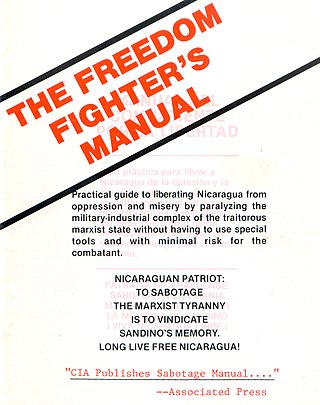
The Freedom Fighter's Manual is a fifteen-page propaganda booklet that was manufactured by the United States Central Intelligence Agency and airdropped over Nicaragua in 1983, with the stated goal of providing a "Practical guide to liberating Nicaragua from oppression and misery by paralyzing the military-industrial complex of the traitorous marxist state". The manual explains several methods by which the average citizen could cause civil disorder. A Contra fighter gave the manual to a U.S. reporter in Honduras in 1984.
Thomas Powers is an American author and intelligence expert.
Several scholars have accused the United States of involvement in state terrorism. They have written about the US and other liberal democracies' use of state terrorism, particularly in relation to the Cold War. According to them, state terrorism is used to protect the interest of capitalist elites, and the U.S. organized a neo-colonial system of client states, co-operating with regional elites to rule through terror. This work has proved controversial with mainstream scholars of terrorism, who concentrate on non-state terrorism and the state terrorism of dictatorships.
CIA activities in Syria since the agency's inception in 1947 have included coup attempts and assassination plots, and in more recent years, extraordinary renditions, a paramilitary strike, and funding and military training of forces opposed to the current government.
Since the 19th century, the United States government has participated and interfered, both overtly and covertly, in the replacement of many foreign governments. In the latter half of the 19th century, the U.S. government initiated actions for regime change mainly in Latin America and the southwest Pacific, including the Spanish–American and Philippine–American wars. At the onset of the 20th century, the United States shaped or installed governments in many countries around the world, including neighbors Hawaii, Panama, Honduras, Nicaragua, Mexico, Haiti, and the Dominican Republic.

The participation of the United States in regime change in Latin America involved US-backed coup d'états which were aimed at replacing left-wing leaders with right-wing leaders, military juntas, or authoritarian regimes. Intervention of an economic and military variety was prevalent during the Cold War. Although originally in line with the Truman Doctrine of containment, United States involvement in regime change increased following the drafting of NSC 68, which advocated more aggressive actions against potential Soviet allies.
Common Courage Press is a book publishing company based in Monroe, Maine.
CIA involvement in the Whitlam dismissal is an allegation that the U.S. Central Intelligence Agency (CIA) was involved in the 1975 Australian constitutional crisis, which culminated in the dismissal of Prime Minister Gough Whitlam.
